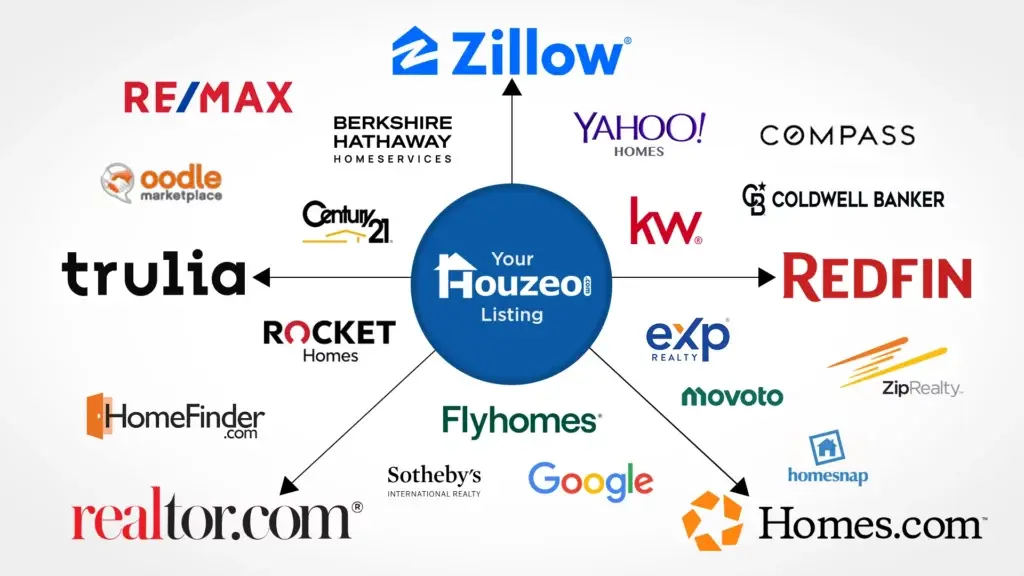Homes in Rhode Island are spending just around 25 days on the market. Moreover, the median home sale price has shot up to $534,400! Wonder how? It’s simple一limited inventory of homes with high buyer demand and affordable living, the state is drawing in buyers fast!
If you want to get in on the action, this is the time to make your move! Summer is here, and selling in the Ocean State can be as breezy as a walk along the Newport Cliff Walk with a Del’s Lemonade in hand.
KEY TAKEAWAYS
- Prepare your home for sale with enhanced curb appeal, neutral decor, tropical landscaping, and clean outdoor spaces.
- Decide how you want to sell, whether it’s with a local Rhode Island Flat Fee MLS service, a discount broker, or a full-service Realtor.
- Houzeo, Rhode Island’s #1 home selling website, can save you thousands in agent fees. Your home will also be on the MLS within 48 hours.
- Before you price your home in Rhode Island, check the current median home price, recent sales, and mortgage rates.
- Conduct showings to attract buyers. Also, review offers quickly and negotiate smartly.
- Finally, schedule utility transfers, pay your closing costs, and prepare to move out.
7 Easy Steps to Selling a House in Rhode Island
Home sales in Rhode Island are not as complicated as you might think. You just need to follow these simple steps to sell your home fast:
Step 1: Prep Your Home for Sale
First impressions matter, especially in Rhode Island’s competitive market with charming coastal homes and historic architecture. So, focus on curb appeal to make your home look more presentable. Here are 3 tips to make homes for sale in Rhode Island stand out:
- Redo the Landscaping: Redesign your front and back yards to showcase Rhode Island’s coastal beauty. Plant flowers like hydrangeas or Eastern red cedar to create a welcoming space.
- Repaint the House: A new layer of paint can work wonders. Use colors like slate blue, crisp white, and seafoam green to make your house look warm and new.
- Highlight Outdoor Spaces: Homebuyers in Rhode Island are generally drawn to outdoor living. So, whether your outdoor space is a patio, front porch, or backyard, ensure that it is inviting.
Step 2: Stage Your Home and Click Photos
A well-staged home sells faster than clam cakes at a summer festival in Newport. You can stick with traditional staging or give virtual home staging a shot. It can pull buyers like a breezy evening along the Narragansett Bay. Here’s how you can make your house shine:
- Declutter and Clean the House: Empty the garage, clean the roof, and pressure-wash the driveway to have an appealing look.
- Showcase Practical Features: Rhode Island buyers often look for sustainability and safety upgrades like hurricane-resistant windows, impact doors, or energy-efficient appliances. Highlight these in your listing, if any.
- Focus on Spacious Living Spaces: Buyers prefer large windows, natural lighting, and airy rooms. Emphasize these features in your staging and consider the usage of bright colors to make it look spacious.
- Include a Home Tour Video: Home listings with videos get 403% more views than those without it. So, make a video that shows your property in the best light!
Step 3: Decide How to List Your House
If you’re wondering how to sell a house in Rhode Island, you have multiple options! Here are 4 options most sellers go for:
- Full-Service Realtors – Up to 6%: These Realtors provide various services from list to close, but charge a hefty 5% to 6% real estate commission in Rhode Island.
- Flat Fee MLS – $249: If you want to sell your home yourself, you can list on MLS in Rhode Island for a flat fee. With Houzeo, your home can be on the MLS for just $249.
- Discount Real Estate Brokers: These brokers charge a lower fee than traditional agents and offer services like contract reviews and negotiation assistance. Discount real estate brokers in Rhode Island charge between 0.5% and 2% as commission.
- Cash Buyers: They help you sell your home fast for cash. With cash buyers, you can get competitive all-cash offers and close on your terms.
- For Sale By Owner: You can sell your home FSBO without hiring an agent. This gives you full control over the process and helps you save thousands on agent commissions.
Step 4: Price Your Home Competitively
When a property is priced inaccurately, it tends to stay on the market longer than it should. For instance, in Apr 2025, 18.4% of homes in Rhode Island sold with price drops. But worry not! Here’s how to price your home just right:
- Check Local Housing Market Trends: Study the Rhode Island Market trends in cities like Providence and Newportwill to set a competitive price. Overpricing will leave your home sitting on the market longer than a sailboat stuck in Newport Harbor.
- Use Online Home Valuation Tools: Use a free home value estimator to calculate your home’s Fair Market Value.
- Get a CMA: A Comparative Market Analysis helps you understand your home’s worth based on its features and location. With your listing agent’s guidance, you can then quote the right price.
Step 5: Handle Showings and Manage Offers
Once your listing is active, buyers searching for Rhode Island houses for sale will submit showing requests. Here’s what to do next:
- Actively Manage Showings: Promptly accept and confirm any showing requests to create a good impression. Don’t cancel scheduled showings at the last moment, and communicate clearly about clashes.
- Host an Open House: Even a luxuriously-staged home can get overlooked like sea glass on a Narragansett beach. Consult your agent and announce an open house to attract buyers.
- Review and Counter Offers: If you only get one offer, you might have to reduce your asking price. But if many buyers show interest in your home, you can either negotiate or choose the highest and best offer.
Step 6: Ensure Your Home Is Inspection-Ready
Usually, buyers will schedule a home inspection to check for any issues, while the lender orders a home appraisal to figure out the market value. So, fix up any small repairs ahead of time—no one likes nasty surprises!
Being ready for both keeps things smooth and your home’s value strong. It’s all about making sure the buyer feels good and the lender feels confident, so your sale stays on track.
👉 All Set to Sell Your Home? List on the MLS Now!
Step 7: Prepare for Closing Day
Closing day can be emotional, but don’t overlook the formalities. Just follow these final steps, and you’ll be good to go:
- Gather All Documents: Before you sell a house in Rhode Island, keep the paperwork for selling a house by owner ready. This includes the affidavit of title, deed, purchase agreement, tax records, settlement statement, 1099-S tax form, etc.
- Prepare to Move Out: Pack up your belongings and get ready to bid your home goodbye.
- Transfer Ownership: Sign the escrow and title documents to transfer ownership. Once done, you’ll receive the funds, and the buyer’s name will get registered in the public record.
- Closing Costs: The cost of selling a house in Rhode Island includes taxes on selling a house, like Transfer Tax and Property Tax. Also, closing costs for sellers in Rhode Island also consist of HOA, real estate attorney, and home warranty fees.
Quick Summary 📝
Whether you are in the heart of Providence or along the shores of Narragansett, the right strategy is what you need to sell a house in the Ocean State. To start, prepare your home for sale, and click photos. Then, decide how to list your home.
Remember to price your home after checking the local trends. When your listing is live, you start getting showing requests. The buyer will conduct your home’s inspection before you can finally close the deal.
Don’t forget—selling your home in Rhode Island can be exciting, rewarding, and well worth the effort, just like a summer day at Newport’s Cliff Walk!
» Houzeo Reviews: Read what people say about Houzeo—Rhode Island’s best home selling website.


















